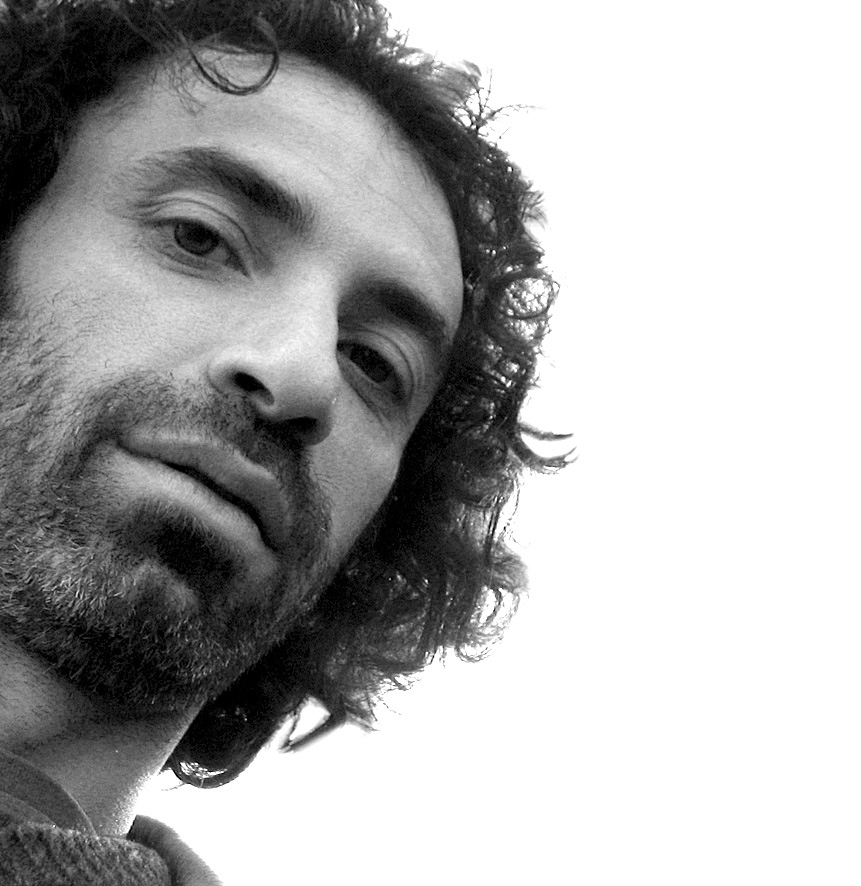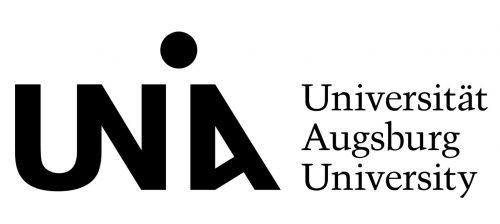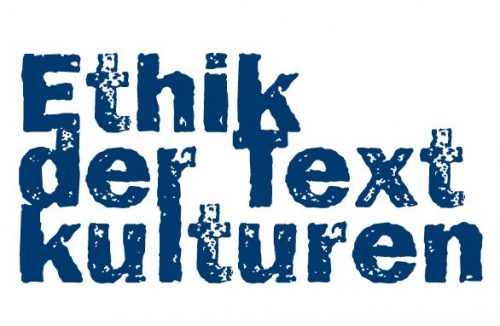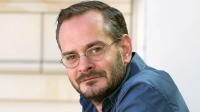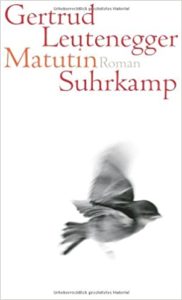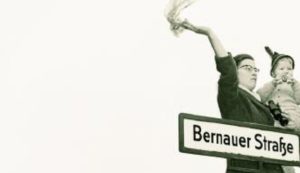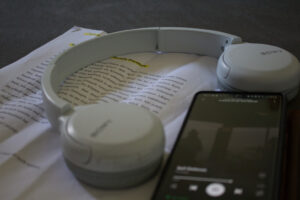Ein Gespräch mit dem Theatermacher Rabin Mroué
von Sabine Wirth und Eike Schamburek
“It’s a total experiment, there are no limits.” Lebanese theatre-maker Rabih Mroué about Western Body Art, Lebanese history and the relationship between fiction and reality.
During the symposium “Reality Strikes Back II — Tod der Repräsentation” in September 2008 in Düsseldorf Schau ins Blau talked to Lebanese theatre-maker Rabih Mroué. Together with his partner Lina Saneh he presented the performance „Who’s Afraid of Representation?” at the FFT (Forum Freies Theater). In this performance the artists are reflecting upon Western Body Art and violence in their home country Lebanon. Thereby they engage in questions of presentation and representation and scrutinise the construction of images in society.
The second performance we talked about was „How Nancy Wished That Everything Was an April Fool’s Joke”, a collage of the stories of different fighters in the Lebanese civil war, which was shown at Wiener Festwochen in May 2008.
Schau ins Blau: In your performance “Who’s Afraid of Representation?” you are contrasting or juxtaposing self-violating acts of Western Body Artists like Chris Burden, Gina Pane and Marina Abramovi? with the everyday violence in Lebanon. In the talk after the performance you said that the initial question for you was: why don’t we have such Body Art in Lebanon? You mentioned that it has something to do with the notion of individualism. Could you describe this thought in more detail?
Rabih Mroué: To explain this I need to make a small digression into Lebanese history. Lebanon was officially founded in 1920 and independence was declared in 1943. Since then Lebanon has had a written constitution by the state and also an oral agreement between the different confessional leaders ruling the country. This oral agreement is much more important than the written constitution, which means that the state is sort of captured by the different religious groups and communities. Today we are still dealing with the same issue. It’s the issue of these groups having to share the state among each other. They split the state so that every confessional group struggles to gain as much as they can from the state for their followers. But at the same time they are condemned to live together with other groups and communities. That means that there is a constant tension between all the different sectarian communities. On one hand they have to fight each other to gain more for themselves and on the other hand they have to live together in the same country. Given this situation, as individuals or as Lebanese citizens we don’t follow the state as such but each citizen follows his/her religious group or confessional community. Even if you are secular in Lebanon you have to follow the sectarians in a sense because they organise the means of life. The notion of individualism is still weak. It exists of course, but it is weak. It would take a lot of effort to achieve individualism just as it was achieved in Europe.
To come back to “Who’s Afraid of Representation?”: Thinking about why these kinds of body performances did not appear in Beirut and the Arab countries, I guess it’s because these artists are dealing with their own body. Dealing with your own body in a ‘communitarian’ society is like saying: “This is my personal body against the body of the community.” Thus, the community will antagonise the individual body. This is why Body Art doesn’t exist in Lebanon till now. Nevertheless it is possible to find exceptions but generally we don’t have it.
Schau ins Blau: I found it quite interesting that you said the criticism uttered by your performance was more directed towards Lebanese society not taking responsibility of the case of Hassan Mamoun. I first thought that it put a critical light on the Body Artists and their acts of self-violation in comparison to the violence being part of everyday life in Lebanon. I think I had the opposite point of view from a Western perspective while I was watching the performance.
Rabih Mroué: The performance was not meant as an accusation of the Body Artists’ work; not at all. On the contrary; I am fascinated by these works. That’s why I am dealing with them. I would like to see this kind of art in Lebanon because it might be able to produce a social shock. We still don’t have it though. My idea was therefore to deal with it in a different way, to reproduce these works by words. And to put them in a different context by pretending that these performances happened as a reaction to the history of Lebanon and the Lebanese Civil War.
Schau ins Blau: In the performance you were not playing a role or acting as a figure but you were performing as yourself — would you agree to that?
Rabih Mroué: This is an open question. It might appear like I am not playing a role, but in fact I am playing a role, I am actually playing two roles; one pretending that I am myself and another one pretending that I am Hassan Mamoun. Even if the differences between the two characters are minimal; even if the difference between the two roles and myself is very little; it is still not me who is on the stage. The question of how we can represent a character on stage is one of my concerns as a theatre-maker. There are many schools or methods of theatre. I suggest this one because conceptually I am working on the relationship between fiction and reality. I want to put the audience into a state of confusion where they have to ask where reality starts and fictions ends. Is this role composed or not? Where is Rabih? Where does the actor start? The borders are blurred. It seems very difficult, if not impossible to me to separate fiction from reality.
Schau ins Blau: Regarding this relationship between fiction and reality I was wondering whether the structure of the performance was coincidental or not. It appeared coincidental to me — as if Lina Saneh was opening the book of Body Artists on a random page and then she would present whatever was on this page — but I suppose it was not as random as it looked like, was it?
Rabih Mroué: Of course it’s not coincidental. It is a game. People easily accept it when you set the rules of any game in theatre. They just accept it because it is theatre. This idea of randomly opening the book is part of the game and it also questions the idea of the book itself. Why for example is Franko B on page five and Marina Abramovi? on page 102? Who decides this? The book follows an alphabetical order but why do we have to go in alphabetical order? All these questions can be asked while we are playing this game on stage. The audience is aware of this game. Our structure is well decided beforehand, although within the game it might occur as if it was by chance. It is an attempt to make people think about the structure of the book which could also be a different structure. In the end it questions the construction of knowledge and history. It also questions the way art is archived; how the artists are classified in this book; how they are all put into one box just because they are dealing with their body.
Schau ins Blau: I had the feeling that the question of guilt and responsibility plays an important role in “Who’s Afraid of Representation?”, especially within the story of Hassan. Would you say that there is a certain responsibility that every artist has? Maybe an ethical dimension of art?
Rabih Mroué: This is a complicated question. What is the ethics in art? I can’t really tell. I myself admire manipulating people. But this can mean different things. From my point of view art is not propaganda, or political in a narrow sense. Theatre is a place where you think; where you can question things and shake norms and stereotypes. It’s a total experiment; there are no limits. But an ethical issue for me would be to exploit art for political propaganda trying to brainwash the audience.
Schau ins Blau: For me Body Art is closely linked to Christian aesthetics. There is a lot of self-violence and representation of pain and suffering in Christian imagery. Many performance-artists play with these images, for instance Marina Abramovi? in “Lips of Thomas”. Do you think an Islamic audience perceives these images in a different way?
Rabih Mroué: To be honest, in this performance my interest was not in the religious aspect of the Body Artists’ works. And to be more honest, I can’t answer your question because if I answer it, then I am afraid of going into this trap of generalizing things. But I would like to tell you a story. When the Americans declared the war against Iraq, there was a female artist in the States who did a happening, a body-performance. She stood on the street in a square, naked. I guess she is a Syrian artist. Being naked in her performance was meant as a protest and an objection to the war against Iraq. So, what happened was that many of the Arab websites and even the newspapers talked about this woman as a prostitute. They took her protest as an affront against the tradition. How dare this woman be naked on the street! They didn’t read her performance as a political statement against the Americans; for them, for the Arabs. So, in the end they were accusing her for her loyalty to the Arab world or Islamic world or etc. This is just one example how things might go.
But I think this is not only related to Islam. I mean, it’s not only a matter of religion but it is related to the region. Anyway, when we talk about Arabs, Arab does not mean “Islam” and “Muslims”. There are also Jewish Arabs, Christian Arabs, and so on. “Arab” is not a religious term.
Schau ins Blau: Would you say that the relationship between what is happening on stage and the audience is one of confrontation? Because you often say about your work that it is not about explaining but more about questioning.
Rabih Mroué: Yes, it’s about confrontation. This goes back to the question of acting. In the classical method of Stanislavsky they usually create a tension between different characters or inside the character him/herself. I prefer to create a tension between the stage and the audience instead of creating a tension on the stage and inside the scene. When I create this tension I hope that people will start to think because they feel engaged with the performance. I don’t want them to be passive spectators who are just receiving what we are giving them. This is related to Brecht and his method and ideas. The audience should reflect upon the relationship between fiction and reality. In other words, the audience should think about the border between the stage and where they sit. I am trying to make the two spaces intermingle by keeping the line between them very sharp and clear. It is not an easy task and of course I can’t say I succeeded or I failed in doing this, because it’s not about failure or success.
Schau ins Blau: You once said to me that your performance “How Nancy Wished That Everything Was an April Fool’s Joke” which was shown at Wiener Festwochen was not made for travelling. Your performances are very much linked to the local situation in Lebanon. Do you think therefore the Lebanese audience is always the “first” audience and the audience in every other country is necessarily on a second level?
Rabih Mroué: I didn’t mean exactly that this performance was not made for a foreign audience. Of course, in the first instance it was made for the Lebanese audience in Beirut. One of the main things that I wanted to say in this piece was that I am afraid of another civil war in Lebanon. I wanted to recall what we all committed as Lebanese during the civil war in order to think about it and maybe to learn for the present and for the future. But thinking about the audience as a theatre-maker is a problematic issue. If you start to put an audience into your mind, you will start to work for these people, either to provoke them or to convince them or to satisfy them. Either way it would mean making a compromise. If you think about a specific audience, you are getting yourself into a trap. This is a big problem and a lot of artists get themselves into this trap. I always think of an abstract audience. I don’t know who this audience is but I try to represent it by myself. I try to be my own audience; to attack myself; to criticize myself. My work should first of all provoke me if there is a need for provocation. It should shake my norms in the first place, not yours. I have to change myself in each work because I understand it as a process of thinking; of producing ideas and of developing myself. Otherwise it would just be a production for the art market.
Schau ins Blau: I would like to ask you something about the formal aspects of “How Nancy Wished That Everything Was an April Fool’s Joke”. The performers are sitting on a sofa talking about the Lebanese civil war. Images only appear as projections on four screens. Why did you choose language as the dominant form of (re)presentation in this performance?
Rabih Mroué: We are living in the age of the image. The eye is the king of the sense organs and seeing is the most important way of perception. With regard to the popularity of the eye it seems difficult for me to represent or to reproduce everything visually on stage. Therefore I often use words to create pictures. If you want to see something as a spectator, you have to build the image in your mind. This way the image does not exist materialistically and is not a document. I have the feeling that this virtual image is much stronger than putting a concrete image on stage. The use of images in my works is very little. I wouldn’t say minimal but condensed; I try to condense images. For example in “Who’s Afraid of Representation?” there is an image when I am next to the screen at the table and Lina enters behind the screen and her photo, her image appears on the screen. This is a condensed image in my view because it tells a lot. Another example is the scene where Lina lies on the floor; gets up and the image of her body on the floor remains as a trace on the screen. This expresses a lot and there is no need to make more effects, or to produce more images.
Schau ins Blau: In your works you often use documentary material like newspaper articles or photos. What is the effect of this method of putting some ‘relicts of reality’ into a performance that also plays with the relationship between fiction and reality?
Rabih Mroué: This question is also related to the production of images. Is it necessary to produce fictional stories when we are for example living in Lebanon? There are already a lot of stories and documents around us that need to be questioned. I don’t mind working on a fictional story but at the moment working with documentary material makes more sense to me. I think it’s a good way to make people think about what they are doing in their daily life. Especially how they deal with the media; how they get information; where they get information from etc. I put pieces of “reality” on stage and try to analyse and deconstruct them. “Looking for a missing employee” is a good example; in this piece I just read out newspaper articles following an interesting case about a missing employee from the finance ministry. It is just an attempt to understand the circumstances that we are living in today.
Schau ins Blau: So, your relationship to the media is very a critical one and you are questioning the construction of reality in the media in your work?
Rabih Mroué: Yes, of course. But it’s not an accusation. I am not saying that the media always misleads its readers and viewers. On the contrary, I to try to understand how the mechanism works. I’m not saying that I am outside of it and able to point the finger on the media. We are part of this machine — if we want to be or not. So it’s better to understand how this machine works. If we discuss and analyze the mechanisms of the media then perhaps we can understand it much better.
Schau ins Blau: I think it is also a matter of what one can say; what is allowed to be said. Did you make any experiences with censorship?
Rabih Mroué: Yes I did. We always have problems with censorship in Lebanon. It’s the law that we have to apply for a permission to perform. We have to hand in the script and they censor what they think needs to be censored. But this is only the official censorship; from my point of view the most dangerous thing is auto-censorship. In 1989 my partner Lina Saneh and I decided not to go through the censorship anymore. We started to present our pieces just for two or three nights without permission but we discovered that the official censorship was not the main problem. The biggest problem was how one could work on the self-censorship in his own head. How one could cross his own norms and prejudices. How one could break these taboos and hidden mechanisms of self-censorship. I believe that you can find censorship everywhere in the world, not only in Lebanon or the Arab world. It is just a matter of different forms and levels.
Schau ins Blau: I have a quote here from Peter Brook’s “The Empty Space” where he defines his understanding of theatre: “I can take any empty space and call it a bare stage. A man walks across this empty space while someone else is watching him and this is all that is needed for an act of theatre to be engaged.” Would you agree on this definition of theatre?
Rabih Mroué: Yes, definitely! Lina and I actually used this definition in our performance “Biokhraphia” to defend our view of theatre. We are permanently accused by theatre-makers who think our work is not theatre anymore. There is no acting in the classical sense, for example. We like to go back to the definition of theatre and to raise this question again: what is theatre? I like Brook’s definition because it is so open. It is a very generous definition. There is an empty space and I can add something. I can fill this space with whatever I want but at some point I have to leave this space, leave it empty, for other people to come and fill it again. One shouldn’t invade this space for too long.
Schau ins Blau: You told me that in spring 2008 you were invited to Japan to perform but you couldn’t leave Lebanon because they had closed down the airport. What you did then was something like an ‘Internet-live-performance’. You performed in your living room in Beirut and it was broadcasted via the Internet to the audience in Japan. The set designer of the performance, Samar Maakaroun, was in Japan and prepared everything needed to make this broadcast show possible. This, I suppose, questions the definition of theatre as physical co-presence of actor and spectator in one space, doesn’t it?
Rabih Mroué: The Internet makes things more complicated, indeed. Having this in mind, Brook’s definition becomes more complex but is still valid. What is physical presence? In Japan we did this performance called “Looking for a Missing Employee” via skype. I was in Beirut and my image was on the stage in Japan with the audience watching it. This was theatre par excellence — even if my body wasn’t physically there on stage. Normally in “Looking for a Missing Employee” I sit on the stage next to the audience and my image is projected onto a screen hanging on the stage. Although I am physically there and people can see me, they would always look at the projected image. Physical presence in this case and in the case of the performance in Japan is connected to the knowledge of the audience that the actor is somewhere present. I think they need to know that I am present at the same time they are present. It therefore has to be a live-broadcast to be still accepted as theatre. The audience has to be convinced of the performer acting at the same time they are watching his actions. Otherwise it wouldn’t be theatre any more but a film screening.
Schau ins Blau: What is the situation for artists in Lebanon like at the moment? Are there any public structures that they can rely on or is it more a free scene with its own rules?
Rabih Mroué: Yes, it’s a free scene. We don’t have any funding or financial support from the government or the cultural ministry. From time to time they have a small budget but this is mostly spent on the big commercial and touristy arts and music festivals trying to create a good image of Lebanon. I mean Lebanon is a country that has other priorities than arts to pay for. It has been suffering from civil wars. We had a big war in 2006 where the Israeli army destroyed a lot of the civilian infrastructure in Lebanon; now they have to rebuild everything. So culture is always among the last points on the to-do-list which is okay in a way. We are not complaining, we are just dealing with this situation.
Schau ins Blau: Thank you very much for this talk, Rabih!
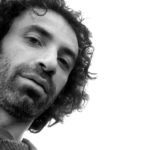
Rabih Mroué was born in Beirut in 1967. He is an actor, director, and playwright, and a TDR Contributing Editor. His plays, performances, and videos question the definitions of theatre and the relationship between the space and form of the performance and, consequently, question how the performer relates with the audience. His works deal with the issues that have been swept under the table in the current political climate of Lebanon. He draws much-needed attention to the broader political and economic contexts by means of a semidocumentary theatre.
